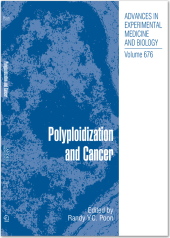 Neuerscheinungen 2010Stand: 2020-01-07 |
Schnellsuche
ISBN/Stichwort/Autor
|
Herderstraße 10
10625 Berlin
Tel.: 030 315 714 16
Fax 030 315 714 14
info@buchspektrum.de |

Randy Y. C. Poon
Polyploidization and Cancer
Ed.: Poon, Randy Y. C.
2010. xv, 151 S. 1 Tabellen. 254 mm
Verlag/Jahr: SPRINGER, BERLIN 2010
ISBN: 1-441-96198-4 (1441961984)
Neue ISBN: 978-1-441-96198-3 (9781441961983)
Preis und Lieferzeit: Bitte klicken
Limiting genome replication to once per cell cycle is vital for maintaining genome
stability. Although polyploidization is of physiologically importance for several
specialized cell types, inappropriate polyploidization is believed to promote aneuploidy
and transformation. A growing body of evidence indicates that the surveillance
mechanisms that prevent polyploidization are frequently perturbed in cancers.
Progress in the past several years has unraveled some of the underlying principles
that maintain genome stability. This book brings together leaders of the field to overview
subjects relating to polyploidization and cancer.
1. Polyploidy, Aneuploidy and the Evolution
of Cancer.................. 1
Lauren M. F. Merlo, Li?san Wang, John W. Pepper, Peter S. Rabinovitch
and Carlo C. Maley
Abstract.................... 1
Introduction................... 1
The Tetraploidy to Aneuploidy Progression in Carcinogenesis................. 1
Tetraploidy and Aneuploidy in Barrett´s Esophagus................ 2
Not All Aneuploids Are Equal................. 4
Why Do Cancer Cells Survive with Such Massive Alterations to Their Genome?......... 5
Why Is Aneuploidy Common in Neoplastic Progression?................. 7
DNA Damage Sensing by Linkage................ 10
Ancient and Recent Cancer Genes............... 10
Conclusion................... 10
2. Molecular Mechanisms and Function of the Spindle Checkpoint, a Guardian of the Chromosome Stability................. 15
Daisuke Ito and Tomohiro Matsumoto
Abstract................... 15
Introduction................. 15
Bipolar Attachment and Chromosome Congression............... 16
Molecular Basis of the Spindle Checkpoint.................. 17
Activation of the Spindle Checkpoint Signaling................... 19
Mad2 Template Model................ 20
Phosphorylation and Spindle Checkpoint Function............. 21
Silencing the Spindle Checkpoint.................. 22
Additional Surveillance System.................. 22
A Trigger of Tumorigenesis.................. 24
Conclusion.................. 24
3. Understanding Cytokinesis Fa ilure............... 27
Guillaume Normand and Randall W. King
Abstract.................. 27
Cytokinesis Occurs in Multiple Stages................. 27
Stage I. Positioning the Division Plane and Initiating Cytokinesis.................... 28
Stage II. Ingression of the Cleavage Furrow............... 30
Stage II. Formation of the Midbody................ 34
Stage IV. Abscission.................. 35
Regulation of Cytokinesis............. 38
Coupling of Cytokinesis to Other Cellular Pathways............... 42
Conclusion................ 434. DNADamage and Polyploidization................ 57
Jeremy P.H. Chow and Randy Y.C. Poon
Abstract .............. 57
Polyploidization and Cancer................. 57
Mechanisms of Polyploidization................. 58
The DNA Damage Checkpoints................. 60
Polyploidization Induced by DNA Damage................... 62
The Sensitivity of Polyploid Cells to DNA Damage................. 64
Polyploidization and Cancer Therapies................. 64
Conclusion................. 65
5. Role of the p53 Fa mily in Stabilizing the Genome and Preventing Polyploidization............... 73
Flaminia Talos and Ute M. Moll
Abstract.............. 73
p53-Tumor Suppressor.............. 73
p53 and Genomic Stability............... 74
Introduction to p73.............. 78
p73 Functions................... 79
The Role of p73 in Genomic Stability................. 80
Conclusion.................... 86
6. Centrosomes, Polyploidy and Cancer................. 93
Anette Duensing and Stefan Duensing
Abstract.................. 93
Introduction................ 93
The Centrosome Duplication Cycle.................. 94
Aberrant Centrosome Numbers in Cancer Cells..................... 94
Multiple Pathways Can Lead to Aberrant Centrosome Numbers: Studies Using Human Papillomavirus (HPV) Oncoproteins..................... 95
Mechanisms of Centrosome Amplification in Tumor Cells.................. 96
Aberrant Centrosome Numbers as a Consequence of Polyploidy-Implications
for Genomic Instability in Cancer............... 99
Aberrant Centrosome Numbers as a Cause of Polyploidy.................. 100
Conclusion...................... 101
7. Polyploidy: Mechanisms and Cancer Promotion in Hematopoietic and Other Cells................ 105
Hao G. Nguyen and Katya Ravid
Abstract.................. 105
Overview: Characteristics of Polyploidy and Its Induction Under Different
Conditions ..................... 105
Prevalence of Polyploidy/Aneuploidy in Different C


